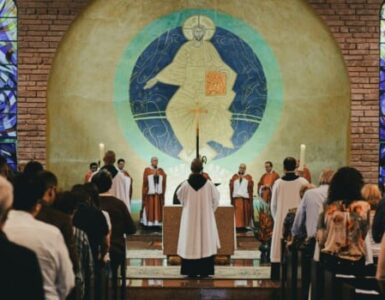“Increase our faith.”
Jesus had just assured His disciples of the inevitability of temptations and the severe consequences of scandalous behavior:
Temptations to sin are sure to come; but woe to him by whom they come! It would be better for him if a millstone were hung around his neck and he were cast into the sea, than that he should cause one of these little ones to sin. (Lk 17:1-2)
The disciples, probably sensing their need for a stronger faith to overcome these temptations and avoid the consequences of scandals, belted out their response, “Lord, increase our faith!” They acknowledged the gift of faith in their lives; but they also realized that this faith had to grow if they were going to triumph over temptations and avoid scandalous behaviors.
We all know fellow Catholics who have fallen away from the faith for several reasons. Their departure from the faith may be due to the scandals in the Church, bad experiences within the Church, poor preaching and catechesis, severe hardships and painful tragedies in life, being uncomfortable with Church teachings, poor liturgy, or they just slowly drifted away.
The bottom line in these departures from the faith is that their Catholic faith failed to grow as their trials and temptations deepened and continued. If the gift of our divine and Catholic faith that we received at baptism does not grow constantly, in good times and bad times, it would surely die in the face of the temptations and hardships of life.
Let us consider five ways in which we can grow constantly in our faith in the face of all the temptations and trials of life that shake the foundations of our faith.
First, be grateful for the gift of faith. We lose our faith when we take it for granted. When we are not grateful for the fullness of the means of salvation found in our faith, then we become complacent in preserving our faith, giving witness to that faith, and in growing in that faith. We begin to compromise with sin and ignore its deadly power to corrode our faith.
Second, be constant in prayer, begging Jesus to increase our faith. God may never give us what we ask for in prayer; but He never fails to strengthen our faith as we call out to Him day and night. Faith matures in a climate of prayer because faith is a lived relationship with God that is based on who God is, what He has done, and what He has revealed to us in Jesus Christ and in His Church, the Catholic Church. We too ought to cry out constantly like the disciples, “Lord, increase our faith!” We must both acknowledge our faith and beg God to increase it just like the father of the possessed boy who cried out to Jesus, “Lord, I believe, help my unbelief.”(Mk 9:23)
Third, we must speak words of faith. Jesus responded to the request of His disciples by asking them to speak words of faith to the obstacles and challenges that they face in life, “If you had faith as a grain of mustard seed, you could say to this mulberry tree, ‘Be uprooted and planted in the sea,’ and it would obey you.” Our faith matures when we speak words that show we still believe in the power, love and wisdom of God even in the face of adversities. But our faith withers and dies when our words show signs of doubt in God, in His love for us, and His power and wisdom.
Fourth, we seek to serve God unconditionally in others. We must see ourselves as “unprofitable servants,” who serve God in others always, whether we are performing the tedious tasks of “plowing or tending sheep,” or the less stressful tasks of “waiting at table.” Our faith grows as we respond to the prompting of divine love to serve God in others, “Faith without works is dead.”(Jame 2:17)
Fifth, we strive to obey God in all things, irrespective of the pains or gains. Our faith matures as we do, not what we like to do or what others expect us to do, but “all that God has commanded us to do.” A life of loving obedience to God is the catalyst for an insurmountable faith.
It is not easy for us to grow in our faith constantly; we need the gentle prompting and strength of the Holy Spirit for the cultivation of such a vibrant faith. That is why St. Paul reminds Timothy to “stir into flame the gift of God,” the Holy Spirit, so that he can experience the only thing that overcomes sin and scandals – the Spirit’s “power and love and self-control.” By these tangible benefits of the Holy Spirit, Timothy can overcome “being ashamed of his testimony to our Lord,” he can “bear his share of hardship for the gospel,” and also “guard this rich trust with the help of the Holy Spirit that dwells within him.” The Spirit is indeed given to us to live and witness to our faith to the fullness and with boldness in all times and seasons.
Today there is a certain tendency to appeal to a nebulous “following of the Spirit” that at the same time denies and subtly rejects the very traditional tenets of the faith. In the name of “listening to the Spirit,” we are now called to doubt and question everything that we believed and held true as divinely revealed. Holy Communion is being offered to people who are living in mortal sin of adultery. Fr. James Martin SJ is going around the world saying that we should go beyond merely accepting persons with homosexual tendencies but now even begin to accept these sinful acts as beautiful and wholesome things. Then Brazilian Cardinal Claudio Hummes, the general relator of the ongoing Amazonian synod, downplays the primacy of divine revelation when he tried to justify the controversial synod’s Instrumentum laboris by saying it is a call to listen to the “voice of the earth.” Even Pope Francis is quick to label faithful clergy as being rigid simply because they stand for the timeless faith and would not attempt to naively “follow a spirit” that is contrary to that which has been revealed and held for over 2000 years.
Where is the sense of gratitude we should have for the Lord who died and rose from the grave that we may have a relationship with Him and the Father in the Holy Spirit by faith? What of the gratitude we owe to those saints and martyrs who held on to the faith and suffered martyrdom just to hand on that faith to us? In our utter ingratitude for the gift of faith, we seem to be saying today, “Lord, change our faith!” instead of “Lord, increase our faith!” Why aren’t our words showing that we believe in God and all that He has revealed to us when we face hardships and trials? Where is that obedience to God and dutiful service to the truth before all that makes our faith triumph over all adversities?
These are the scandalous and sinful times when our faith is being put to the test. Many are losing their faith in Christ and in His Church. Jesus Christ sent us His Spirit for the reason of “guiding us to all truth,” and to “declare to us all that in Jesus.”(Jn 16:13,15) so that we live out our faith with courage and fidelity in scandalous times like these. His Spirit is not given to us to dispense us from the tenets and teaching of the faith and morals. The Spirit makes our faith alive and vibrant, constantly growing through all that we face in this life, personally and in the communion of the Church.
Jesus Christ, whom we approach today with the gift of our Eucharistic faith, is forever the “author and perfecter of our faith.”(Heb 12:2) Let us first of all thank Him continuously for the gift of this faith. He constantly communicates to us His own Spirit to intensify and purify our faith. When He asked us, “When the Son of Man comes, will He find faith on earth?”(Lk 18:8), He is asking us if our faith in Him and His words will grow constantly till He returns in glory or are we going to mock, reject, and falsify the faith to fit our changing times? Should we choose to let our faith grow constantly, there is nothing that our faith cannot overcome, even the sins and scandalous behaviors and teachings in our Church today.
Glory to Jesus!!! Honor to Mary!!!













